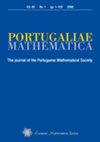伪等式证明理论
IF 0.8
4区 数学
Q3 MATHEMATICS
引用次数: 9
摘要
从给定的伪恒等式集{\ Sigma}证明伪恒等式的一个新方案,显然是正确的,在许多情况下也被证明是完整的,例如当{\ Sigma}定义局部有限变时,群的伪变,更一般地,完全简单半群的,或交换半群的。当{\ Sigma}定义了一个伪变种V时,给出了该方案是完整的许多进一步的例子,该伪变种V对于方程x=y是可约的,前提是{\ Sigma}足以证明V生成的各种{\西格玛}-代数的恒等式的基。这为证明方案总体上是完整的猜想提供了充分的证据。本文章由计算机程序翻译,如有差异,请以英文原文为准。
Towards a pseudoequational proof theory
A new scheme for proving pseudoidentities from a given set {\Sigma} of pseudoidentities, which is clearly sound, is also shown to be complete in many instances, such as when {\Sigma} defines a locally finite variety, a pseudovariety of groups, more generally, of completely simple semigroups, or of commutative monoids. Many further examples when the scheme is complete are given when {\Sigma} defines a pseudovariety V which is {\sigma}-reducible for the equation x=y, provided {\Sigma} is enough to prove a basis of identities for the variety of {\sigma}-algebras generated by V. This gives ample evidence in support of the conjecture that the proof scheme is complete in general.
求助全文
通过发布文献求助,成功后即可免费获取论文全文。
去求助
来源期刊

Portugaliae Mathematica
MATHEMATICS, APPLIED-MATHEMATICS
CiteScore
0.90
自引率
12.50%
发文量
23
审稿时长
>12 weeks
期刊介绍:
Since its foundation in 1937, Portugaliae Mathematica has aimed at publishing high-level research articles in all branches of mathematics. With great efforts by its founders, the journal was able to publish articles by some of the best mathematicians of the time. In 2001 a New Series of Portugaliae Mathematica was started, reaffirming the purpose of maintaining a high-level research journal in mathematics with a wide range scope.
 求助内容:
求助内容: 应助结果提醒方式:
应助结果提醒方式:


